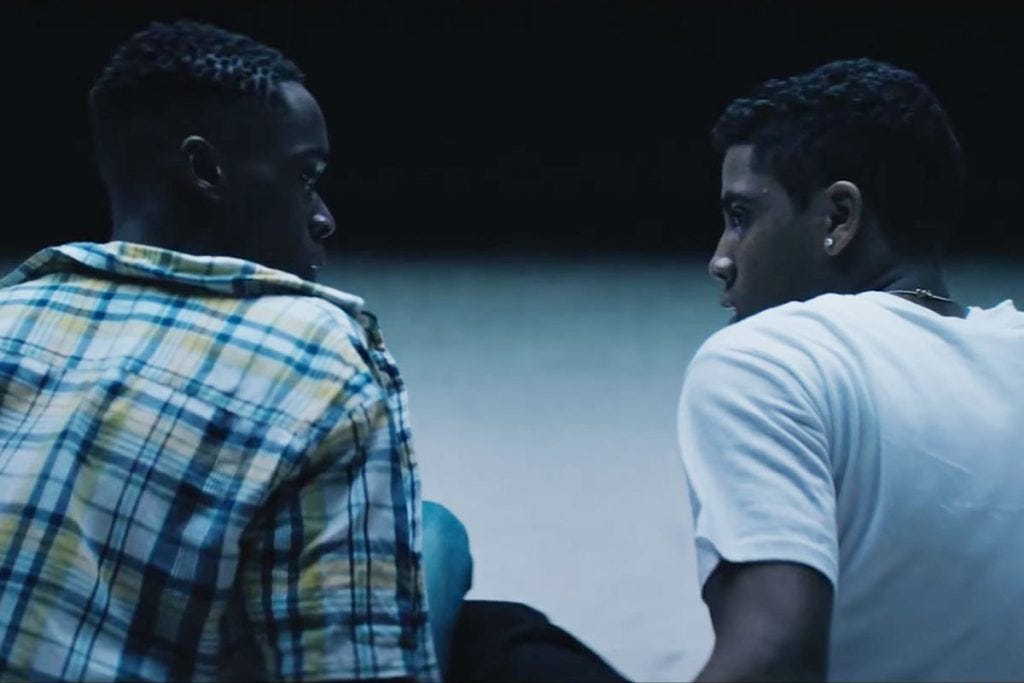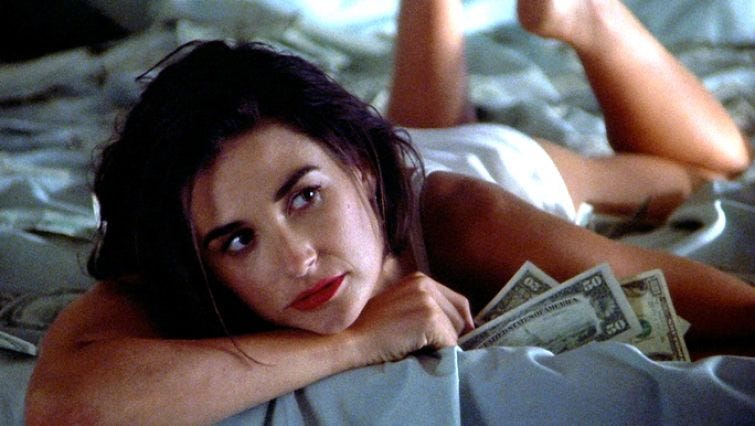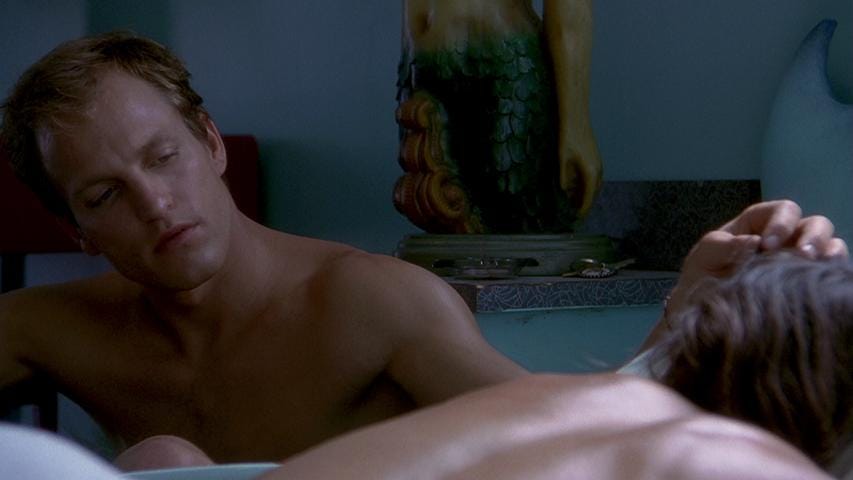David Murphy
On gay movies and straight movies

I walk out of movies for fun. I mean, I don’t like going to see a movie so irredeemably bad I am forced to leave in a swishy fit of pique, but I have to admit I take a little pleasure in doing it when I must (but only when I must and usually when I’m really really high).
Though we haven’t been dating long, my girlfriend, J, already knows I’m like this, so when the credits rolled on the 10:15 pm showing of Portrait of a Lady on Fire on Valentine’s Day, she asked me if I’d had my special dramatic urge to make an exit. I would have, I told her, if I hadn’t fallen asleep.
At least we disliked everyone's favorite Lesbian Movie together. Later, J told some lesbians that she had gone to see it with her boyfriend and that neither of us had liked it. The lesbians shook their heads: You wouldn’t get it, they told her. Someone with a boyfriend wouldn’t understand a lesbian movie.
They got us wrong, but not by much. I may be a dyke, but I rarely feel understood by movies about lesbians, nor do I seem to understand them. I’m also fascinated with straight cinema, finding depictions of heterosexual romance to be all the more romantic for the many challenges that face these fundamentally unequal relationships (at least in terms of gender identity, if not trans status). I also find them to be less alienating than most explicitly gay or queer media, especially the dramas. I came of age when the first serious, mainstream dramas about us—Boys Don’t Cry, Brokeback Mountain—were touted as signaling a cultural shift in favor of dykes and fags, when all they did was traumatize me and my baby queer friends while getting our stories all wrong. Maybe I just hate myself. I don’t know.

In any case, with exceptions like the luminous Moonlight, I tend to avoid Oscar-bait and critically acclaimed flicks about gay people, and flat-out ignore them if they’re about trans people. The payoff aint worth the risk of having my feelings hurt, and I despise seeing straights make money for playing queer at no professional cost. At least the It Boys and Girls of yesteryear had to ask themselves, before signing on for longing gazes and wispy lisps, if the critical acclaim was worth losing their career—or worse.
Carol left me dry—can’t anything gay, especially any thing about gay women, have some damn juice? I submitted to the tedium of Boy Erased because of Nicole Kidman’s wig and Troye Sivan, respectively. I thought The Handmaiden was brilliant, but had a lesbian-specific bone to pick with it. I didn’t even bother with Disobedience. (I enjoyed The Favourite, but that was a movie whose primary object of desire was power, not the lesbian body.)
I used to worry that I liked straight people, and their stories, too much. Was it because I’m secretly straight (this is an anxiety I explored in my first book)? Was it because I have Munchausen’s after a lifetime in a heterosexist society?
I don’t worry about that anymore. I’ve come to accept that I love straight people, from afar, anyway. I joke about someday becoming an academic and creating a straight studies course.
If I were designing the curriculum right this moment, Indecent Proposal (1993) would surely be on it. It’s a very good romantic drama (romdram) about a happily married couple, David and Diane Murphy—played by Woody Harrelson and Demi Moore—who fall on hard times and are offered a million big ones by a foxy old billionaire in exchange for one night with the gorgeous yet down-to-earth Diane. It’s a great romdram in that it’s indulgent, ridiculous, and has a more or less happy ending. The actors are beautiful enough to sweeten the plot’s vapidity (and better vapid than didactic, I always say). Even the billionaire, played by upright chunk of petrified wood, Robert Redford, is beautiful, though less stupid than his costars.

Sex and sexual chemistry are crucial for the successful romdram, and Proposal sticks the hell out of that landing. A romdram and its variants (thriller, crime, comedy) can have too much sex, to which anyone who’s white-knuckled their way through Body of Evidence can attest. It can also have not enough sex—like have you seen The Last of the Mohicans? That horrible, ambiguous “love” scene between DDL and Madeleine Stowe, like a waist-up shot of teens fooling around in a closet. Are they hugging really hard or are they really yankee-doodle doing it? Maybe he’s fingering her? Who’s to say? Then there’s weirdly paced sex, the kind that doesn’t permit you the pleasure of anticipation, which really kneecaps the hotness of your Mississippi Masalas and your American Gigolos.
But not Proposal. Proposal has the perfect amount of sex that’s just revealing enough. It’s <chef’s kiss> judicious sex-having. We get to enjoy the star-crossed couple’s demented kitchen-floor-fuck and their Vegas-money-bed fuck, and we ALSO don’t ever get to see Diane fuck Redford’s John Gage (although: Let old people fuck! Please revisit the epitome of the genre in the Grace and Frankie scene between Jane Fonda and Sam Elliott), much as we might want to. But again, judiciousness—this is a good thing. Showing Gage and Diane’s fuck scene would be like revealing the monster in a suspenseful horror movie: Sometimes it’s just scarier (or in this case, sexier) to use your imagination. Not getting what you want is hot, too.
And that’s just pacing, which is what good seduction boils down to. Gage, a capitalist cad in ill-fitting double-breasted suits, isn’t just seducing the Murphys with his money—he’s seducing the audience into doubting our own convictions about adultery and, theoretically, prostitution. Ebert puts it well in his review, which I recommend, even though he finds an excuse to be transmisogynist about—drumroll please—The Crying Game:
The movie is deliberately designed to place the viewer in the position of assessing his or her own ideas about marital fidelity and putting a price tag on them…ingenious in the way it surrounds its essentially crass subject matter with a camouflage of romantic scenery.
And seduced we are. Diane, in her culturally appropriative cocktail dress, spends her night on a yacht with Redford, who really doesn’t come across as a guy who eats pussy but, by her account, is regardless a good lay. Dubious David is at first on-board with the arrangement, but dissolves into hysterical rage at the very moment it becomes too late to do anything about it (there are, apparently, no phones on Gage’s yacht).
In the aftermath, their marriage crumbles and so does David’s life. While Diane is slowly lured by Gage into his Malibu mansion, David ends up living in a weird shed with his dog, drunk and prowling the streets, singing the cuckoo’s song with the shameless pride of a man who’s lost everything.
Harrelson is divinely cast. He pivots seamlessly from sexy—confidently self-aggrandizing, squinting yet sensitive, with his minor manly lisp—to despicable, to, finally, redeemed. It helps that he’s the kind of actor who seems like he’s just being himself with everything he does, but not in an annoying or hacky way, like Tom Hanks or Pauly Shore. And that name—Woody! Only a 10 could pull off a name like that. If you need convincing, I invite you to compare him with the other famous Woody.
Woody’s physical beauty is a romdram staple, but that doesn’t make it any less thrilling. One time, years before I started HRT, I told my friend Maddie that Woody in a polo shirt in Cheers was transpo, which is when she pulled up her sleeve to show me one of her many tattoos: Woody in a polo shirt in Cheers, right there on her left bicep. (Her Woody was also a zombie, but that’s the kind of bitch Maddie is: cool to the fucking bone). His beauty is easy to forget when he’s standing next to Demi or Redford, whose charisma overwhelms his quiet appeal, but it’s there.

But the perfect David Murphy must meet his downfall before he can emerge triumphant. Before Diane’s night with Gage, his recklessness with straight marital gender roles foreshadows danger; when he tells Gage that Diane can make her own decisions, we feel the anxiety of witnessing a husband who isn’t in full control. Still, only a real man could come back from the humiliation of having his wife stolen away for a down payment on his house, because of course David and Diane get back together at the end of the movie, once Diane’s had her refractory period and David has done some manful growth, like breaking the habit of keeping his tennis shoes on the kitchen table and getting a fulfilling job as an architecture teacher, where he lectures Gen X on the subjectivity of bricks.
Still, you have to hand it to him. In the moral universe of this film and white patriarchy as we know it, he couldn’t have behaved any other way and still have been a sympathetic protagonist. An enlightened man can’t tell his woman not to accept the Indecent Proposal—it’s the Nineties!—but if he tolerates his wife fucking another man for money (not just any man, but the Sundance Kid! The strawberry-blond smokeshow from The Way We Were!), his emasculation will be total and irreversible. A cuck accepts his wife’s desires; a real man throws a tantrum until she finally breaks down and gives him what he wants.
“So you're saying you can't buy love?” Gage asks Diana, incredulous, and both she and David agree it can’t be done. And maybe love can’t be bought, but as David proves, it can be cajoled, wheedled, expected out of someone. It can be taken for granted, as romantic love is within monogamous heteronormativity.
In Indecent Proposal, as in most other places, straightness is the default, so present as to go unseen, which is why the specter of prostitution never really manifests. Even with the sophisticated legal machinations that make Gage’s wager possible, the lawyers and contracts, the brokers and wedding vows, the act of sex compensated for with a vast sum of money occurs as in interpersonal betrayal outside of commerce. The money is the crux upon which the whole exercise depends, and yet like heterosexuality itself, it vanishes.
David tweets at @k8bushofficial.

